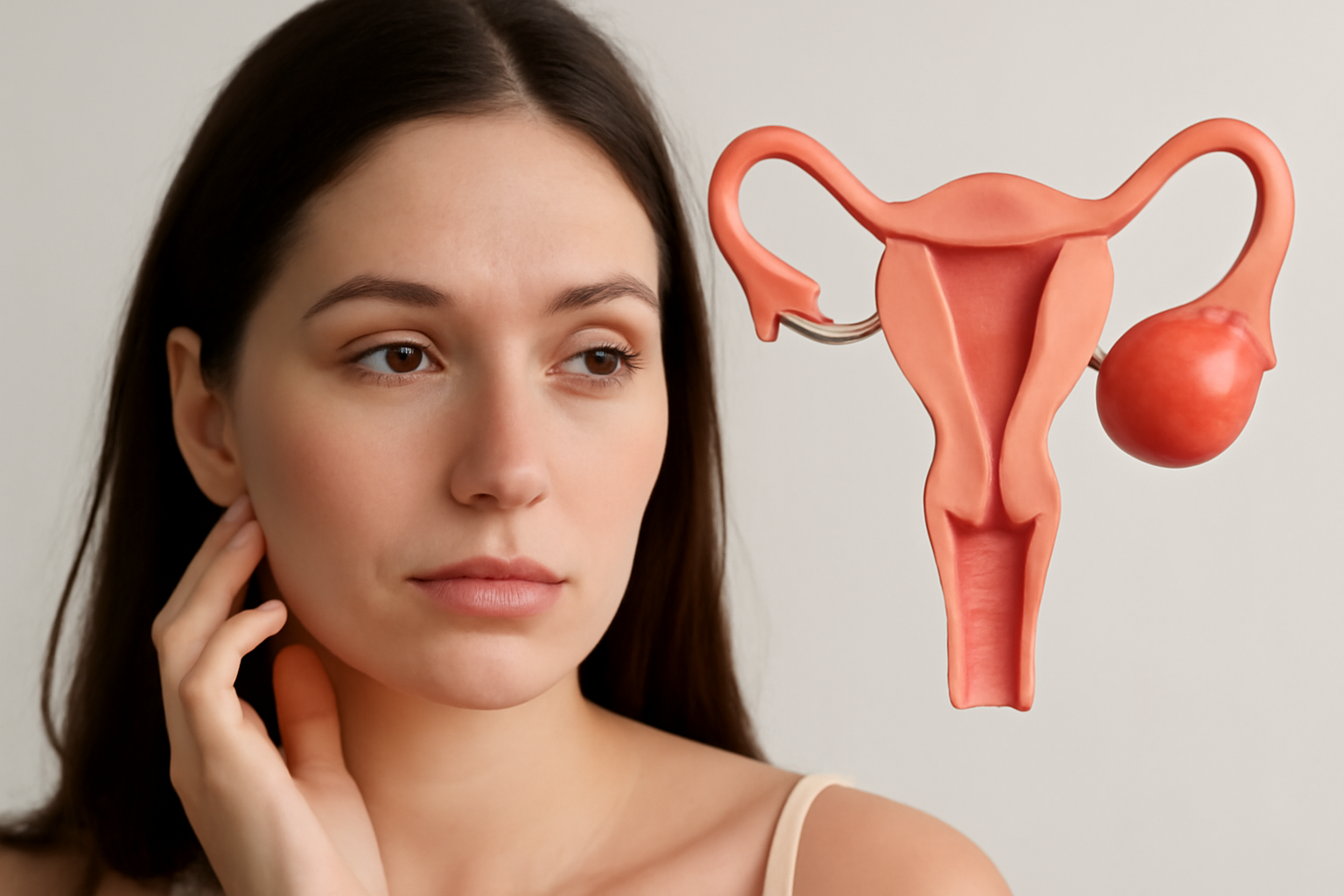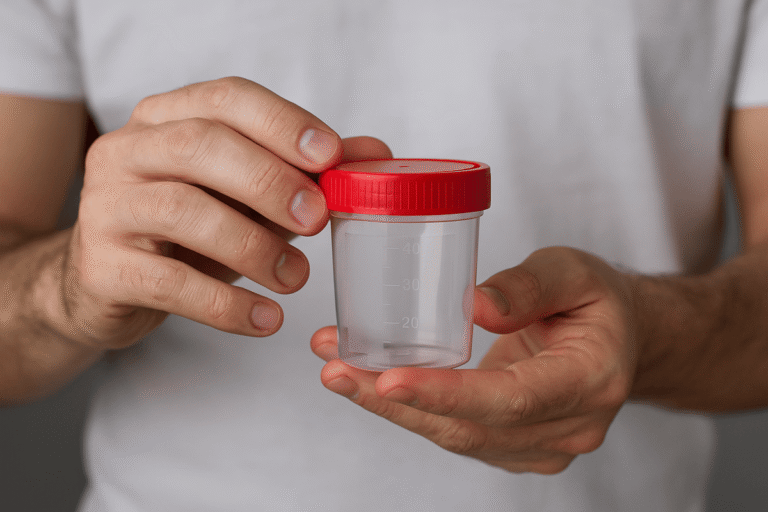Key Takeaways
- Ovarian cysts are common and usually benign, but Can Ovarian Cysts Cause Infertility?
- Different types of ovarian cysts exist, including functional cysts (such as follicular and corpus luteum cysts) and non-functional cysts (like cystadenomas, endometriomas, and polycystic ovary syndrome).
- While many cysts do not cause infertility, conditions like polycystic ovary syndrome (PCOS) can affect ovulation and make pregnancy more difficult.
- Treatment options range from observation to surgery, depending on the cyst’s type and symptoms.
What is an Ovarian Cyst?
An ovarian cyst is a fluid-filled sac that forms on or inside an ovary. They are relatively common in women during their reproductive years and are usually harmless. Most cysts are benign and often resolve on their own without treatment. However, depending on the type, size, and whether they cause symptoms, some cysts can affect a woman’s ability to conceive.
Also read: The Cervix in Early Pregnancy
Types of Ovarian Cysts
Ovarian cysts are classified into two broad categories: functional and non-functional. Let’s explore both to understand their potential impact on fertility.
Functional Cysts
Functional cysts are the most common type of ovarian cyst, typically arising during the normal menstrual cycle. These cysts form as part of the ovulation process and usually disappear on their own. There are two primary types of functional cysts:
Follicular Cysts
Follicular cysts develop when a follicle (a sac containing an egg) fails to release an egg during ovulation. As a result, the follicle continues to grow and forms a cyst. These cysts are usually harmless and tend to shrink and disappear within a few months without treatment.
Corpus Luteum Cysts
After the egg is released from the follicle, the follicle transforms into a structure called the corpus luteum, which produces progesterone to support early pregnancy. If pregnancy does not occur, the corpus luteum typically dissolves. However, sometimes it can fill with fluid, forming a corpus luteum cyst. Like follicular cysts, these are usually non-threatening and often resolve on their own.
Non-Functional Cysts
Non-functional cysts, unlike their functional counterparts, do not develop as part of the ovulation cycle. These cysts tend to be larger and can cause more significant health issues. They may also have a higher chance of affecting fertility.
Cystadenomas
Cystadenomas are fluid-filled cysts that develop from the cells lining the outer surface of the ovary. They can grow quite large, sometimes causing pain and discomfort. If left untreated, these cysts may interfere with fertility and may even require surgical removal.
Endometriomas
Endometriomas, also known as “chocolate cysts,” are caused by endometriosis, a condition where tissue similar to the lining of the uterus grows outside the uterus, often on the ovaries. These cysts can affect fertility by damaging ovarian tissue or disrupting ovulation, making it more difficult to conceive.
Polycystic Ovary Syndrome (PCOS)
PCOS is a hormonal disorder that causes multiple small cysts to form in the ovaries. Women with PCOS often have irregular menstrual cycles, hormonal imbalances, and difficulty ovulating, which can lead to fertility problems. PCOS is one of the most common causes of infertility in women.
Diagnosing an Ovarian Cyst
Diagnosing an ovarian cyst typically involves a combination of physical exams, imaging tests, and sometimes blood tests. A pelvic ultrasound is commonly used to identify the presence and size of a cyst, as well as to determine whether it is functional or non-functional. In some cases, your doctor may recommend blood tests to check for hormonal imbalances or other underlying conditions, such as endometriosis or PCOS.
While functional cysts are usually diagnosed through imaging alone, non-functional cysts may require further investigation to assess their impact on fertility and determine the best course of action.
Do Ovarian Cysts Cause Infertility?
While ovarian cysts themselves rarely cause infertility, certain types can impact a woman’s ability to conceive. The effect depends mainly on the type, size, and whether they interfere with ovulation or the overall function of the ovaries.
Functional Cysts and Fertility
Functional cysts, including follicular cysts and corpus luteum cysts, generally do not cause infertility. These cysts form during the normal menstrual cycle and typically disappear without intervention. However, if a functional cyst becomes unusually large, ruptures, or causes other complications, it can interfere with ovulation or cause pain that affects fertility.
Non-Functional Cysts and Fertility
Non-functional cysts, particularly endometriomas and cystadenomas, can cause more significant fertility issues. Endometriomas, which are associated with endometriosis, can lead to adhesions (scar tissue) around the ovaries and fallopian tubes, which may impair ovulation or block the fallopian tubes. In such cases, fertility may be compromised, and medical intervention may be necessary.
Polycystic ovary syndrome (PCOS), a condition that causes the formation of many small cysts, is another common cause of infertility. PCOS affects hormonal balance and often prevents regular ovulation, which can make conception difficult. Women with PCOS may need fertility treatments like ovulation induction or in vitro fertilization (IVF) to improve their chances of pregnancy.
How Are Ovarian Cysts Treated?
Treatment for ovarian cysts depends on their size, type, symptoms, and potential impact on fertility. Here’s an overview of standard treatment approaches:
Observation
Many small, functional cysts do not require treatment and will resolve on their own. Your doctor may monitor the cyst with regular ultrasounds to ensure that it doesn’t grow or cause complications.
Medications
For women with PCOS, hormonal birth control (such as pills, patches, or IUDs) is commonly prescribed to regulate menstrual cycles and prevent the formation of new cysts. If the cysts are painful, over-the-counter pain relievers such as ibuprofen may be used to manage discomfort.
Surgery
In cases where a cyst is large, persistent, or causing complications (such as ruptures or excessive pain), surgery may be necessary. Laparoscopy is a minimally invasive procedure often used to remove cysts. For more complex cases, a more extensive surgery may be required.
Fertility Treatments
For women with PCOS or endometriosis who are struggling to conceive, fertility treatments such as ovulation induction, intrauterine insemination (IUI), or IVF may be recommended.
Also read: Dollar Tree Pregnancy Test: Can You Trust a $1 Test?
Bottom Line
Ovarian cysts are a common condition that many women experience during their reproductive years. Most cysts, especially functional cysts, are harmless and do not interfere with fertility. However, non-functional cysts, particularly those related to PCOS or endometriosis, can make it more difficult to conceive.
Suppose you have been diagnosed with ovarian cysts and are concerned about your fertility. In that case, it’s essential to consult with a healthcare provider who can guide you through diagnosis and treatment options. In many cases, cysts can be managed with medication or surgery, and with the proper treatment, many women can conceive successfully.





[…] Link Between Ovarian Cyst And Infertility […]